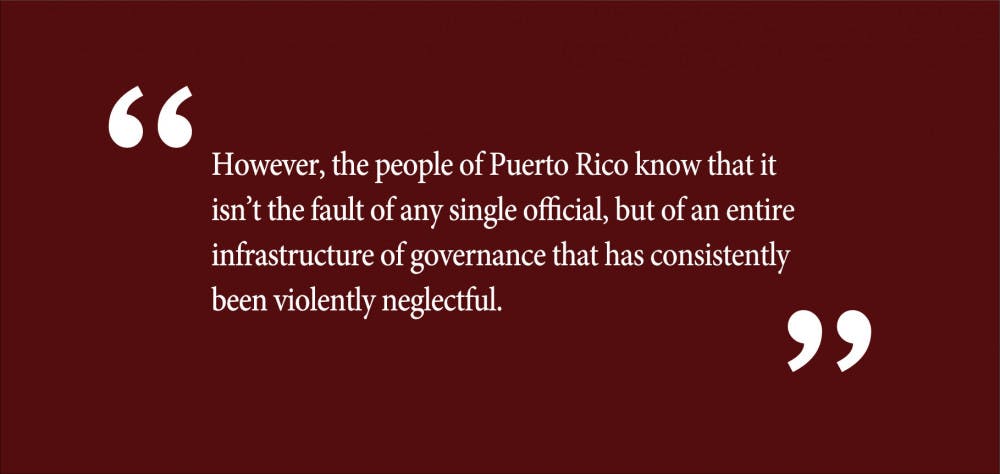Puerto Ricans made headlines around the world in the summer of 2019, when massive protests succeeded in forcing former governor Ricardo Rosselló to resign. Coverage died down after this so-called resolution, and Puerto Rico once again was left in the shadows as the United States’ forgotten colony. But the conditions that caused those first protests haven’t improved on the island itself. On Jan. 7th, Puerto Rico was hit by a 6.4-magnitude earthquake that took down the fragile power grid, leaving the entire island without power for a couple of days and causing massive destruction to the infrastructure, especially in the most affected areas in the South. People lost their homes and their cars; schools were destroyed; roads were cracked open and there was one reported death.
The Puerto Rican government has failed to adequately address its people’s needs. In the face of such incompetence, Puerto Ricans from the less affected areas of the island have undertaken a massive effort to support those most in need. In the weeks following the earthquakes, hundreds of Puerto Ricans sat in traffic for hours in order to reach those in the south of the island, bringing with them food, water, medical supplies and sanitary products, as well as their own expertise. The refugee stations, in which people continue to live today, were set up and are managed by civilian volunteers. Americans and Puerto Ricans alike, especially politicans, celebrate this as a demonstration of the resilience of the Puerto Rican people. But the truth about resilience is that it manifests in the face of injustice, and Puerto Rico has had to be resilient for far too long. The series of affronts to the dignity of the Puerto Rican people demand the reignition of the Puerto Rican political revolution.
The earthquakes once again revealed the island’s lack of preparation for these natural disasters, which are expected to become more frequent with the rising threats of climate change. A month after the large earthquake, there are still thousands of people living in tents on the streets, too afraid to go back into their homes as the ground continues to shake. Only around 20 percent of the schools in Puerto Rico have been able to reopen with full functionality, as inspections mandated after the earthquake reveal that many schools do not meet the standards of construction codes. Puerto Ricans have been thrust back into a state of emergency, as Post-Traumatic Stress Disorder fresh from Hurricane María floods into the collective Puerto Rican psyche.
Puerto Ricans continue to find the manmade disasters of neglect, corruption and colonialism much more destructive than any hurricane or earthquake. As Puerto Ricans from all over the island struggled to get aid to affected areas, residents discovered a warehouse in the southern city of Ponce filled with abandoned supplies left from Hurricane María. In an effort to control the widespread indignation this news produced, Gov. Wanda Vázquez fired Carlos Acevedo, head of the island’s emergency management agency, and promised to launch an investigation. However, the people of Puerto Rico know that it isn’t the fault of any single official, but of an entire infrastructure that has consistently been violently neglectful.
As tensions rise, we also are reminded that the U.S. Federal Government has actively practiced the same neglect. On Feb. 5th, the White House threatened to veto the $4.7 billion aid package intended for earthquake relief in Puerto Rico. Let us not forget, too, that the island is still waiting to receive billions of dollars in aid approved by Congress over two years ago for Hurricane María relief.
Puerto Ricans have organized protests once again in the last few weeks calling for the resignation of Gov. Vázquez. The island has witnessed an outcry of frustration and anger at the lack of responsibility that both the local and the federal government have exhibited in their treatment of the island’s people. And yet, we continue to see a rhetoric that dismisses Puerto Rican protest movements as radical, violent and divisive. Media coverage has focused more on the cost of the protest graffiti drawn on the walls of Old San Juan than on the cost of all the lives lost as a result of the government’s neglect. This coverage has gone out of its way to create a narrative of violent protestors while ignoring the legacy of state repression that exists in Puerto Rico — a legacy that today manifests itself in the use of tear gas against protestors and police infiltration of demonstrations.
I cannot take seriously condemnation of protests in Puerto Rico when I cannot help but feel that the injustices inflicted on the island’s people not only justify, but in fact demand action of this sort. We have not forgotten the lessons we learned last summer about the power of collective action — and I celebrate the Puerto Ricans who continue to exert that power in the hopes of one day achieving a government that is accountable to its people. We must remember that we will not achieve this objective even if we manage to force the resignation of every single subsequent governor. Our collective action must seek to tear down the institution of colonialism and disaster capitalism, not just its political agents. What will these power structures do when Puerto Rican resilience is matched with Puerto Rican resistance?
Marysol Fernandez ’21 can be reached at marysol_fernandez@brown.edu. Please send responses to this opinion to letters@browndailyherald.com and op-eds to opinions@browndailyherald.com.





